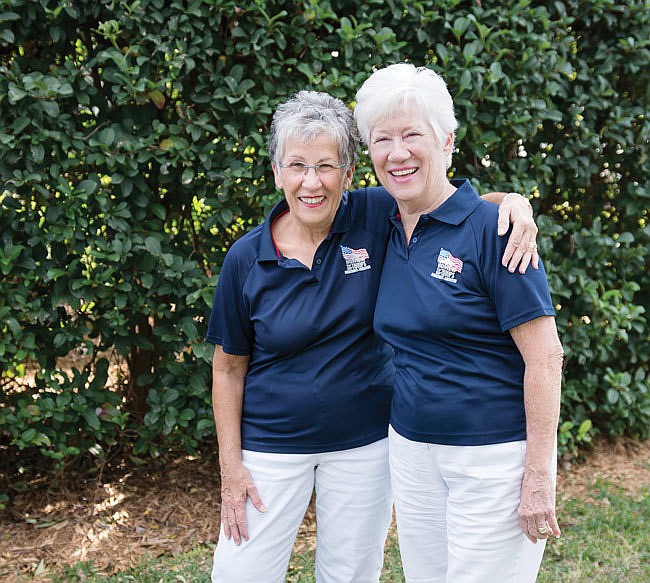- July 26, 2024
-
-
Loading

Loading

Kathi Skelton and Deb Kehoe spent most of their retirement enjoying the quintessential good life at the Rosedale Golf and Country Club. Golfing. Attending breezy social gatherings.
Friends for more than a decade, they were content kicking back and relishing some free time with their husbands.
Until an existential question crept in: Was it enough?
About six years ago, following a dinner at their club honoring veterans, the women had a heart-to-heart talk. “We thought, ‘It’s great we’re attending these dinners, but we’re not giving back much,” Skelton recalls. “We had our health, and it just seemed like we should be doing something other than just enjoying ourselves.”
Inspired by the tenor of the veterans dinner, Skelton called her son Stephen, a lieutenant colonel in the Army, and asked him to recommend a charity that benefits the military. He had one at the ready: Homes for Our Troops.
Founded and headquartered in suburban Boston, HFOT’s core mission is to build mortgage-free, specially adapted homes for severely injured post-9/11 veterans. Since its inception in 2004, the organization has completed 248 homes in 42 states. The charity has expanded its scope over the years to offer an array of services after the vets move into their houses, such as three years of free financial planning.
“We don’t just give them the key and walk away,” says Christopher Mitchell, HFOT’s director of development. “They become part of our family.”
The Skeltons and Kehoes are integral members of that family. They’re the officers. Their husbands — Jim Kehoe, a Vietnam veteran, and John Skelton, a former member of the U.S. Coast Guard — are non-commissioned officers. Other Rosedale residents pitch in when needed.
Mitchell hails the women as “rock stars.” They raise funds, but also awareness. They speak to veterans and fraternal organizations; pretty much any group that will grant them an audience. “They are two of the couple of dozen volunteers around the country we call Core Ambassadors,” Mitchell says.
“We have nametags now,” Kehoe says with a laugh.
The women’s fundraising initiative had modest beginnings. The duo started by placing an item in the Rosedale newsletter and a small display in the pro shop soliciting funds for HFOT at the veterans dinner. They raised $4,000 that first year — a nibble that got them hooked.
In 2014, they threw the inaugural Homes For Our Troops Charity Golf Tournament on the Rosedale course. It made $12,000.
We had our health and it just seemed like we should be doing something other than just enjoying ourselves.”
Kathi Skelton
In 2017, they sold all 140 tournament slots. Those funds, together with money from a November car wash and a $20,000 donation from the Lakewood Ranch Rotary Club, generated $81,000 for HFOT.
The money went toward building a home in Land O’ Lakes for medically retired Army Staff Sgt. Carl W. Moore, who was shot in Afghanistan and suffered a spinal cord injury that left him partially paralyzed below the waist. Moore’s home should be completed by early summer.
A key part of Kehoe and Skelton’s arrangement with HFOT is that all the funds they raise go toward whatever candidate lives closest to East Manatee County. This helps personalize their efforts and keep the money local.
Their first “adoptee” was Alex Dillman, a medically retired Army staff sergeant who moved into his Wesley Chapel home in December 2013. In February 2011, Dillman’s convoy in Afghanistan rolled over an IED, killing one of Dillman’s friends and severely injuring four others. Dillman was paralyzed from the chest down. He spent a year in and out of surgery at James A. Haley Veterans’ Hospital in Tampa. These were naturally dark times. Dillman says being chosen as a recipient by HFOT was “a beacon of hope” for him and his wife, Holly, now both 32.
“We’d go over blueprints, buy pieces of furniture … make plans,” Dillman says. “Every time we got some bad news or things didn’t go well, we’d break out those blueprints, and it let us disconnect from hospital life.”
Being involved in the customization process meant Dillman didn’t have to adapt to the space. He was good to go the second he turned the key.
The 2,650-square-foot house, which was built to HFOT specs, features wide hallways and doorways to accommodate Dillman’s wheelchair, a roll-in shower, roll-under countertops and sinks, among other handicap-accessible features. “I can just come and go as I please,” Dillman says. “It’s routine now. It feels normal again, or the closest it’s going to get to normal.”
The home also allows Dillman to be the primary caregiver for his year-and-a-half-old son, Maximus.
After moving in, Dillman returned to school, landed a contract job in IT working at MacDill Air Force Base and began weight training and competing in hand-cycling competitions. In March, he plans to try out for the Paralympic bobsledding team. Grateful for this second lease on life, he makes appearances and gives speeches to help raise funds for HFOT.
He still maintains ties to his big-hearted Lakewood Ranch benefactors.
“It’s simple: They’re family,” Dillman says. “They were built for it. They’re machines. To see them up in front of a crowd, getting the people engaged, tag-teaming off each other, it’s a beautiful thing to watch.”